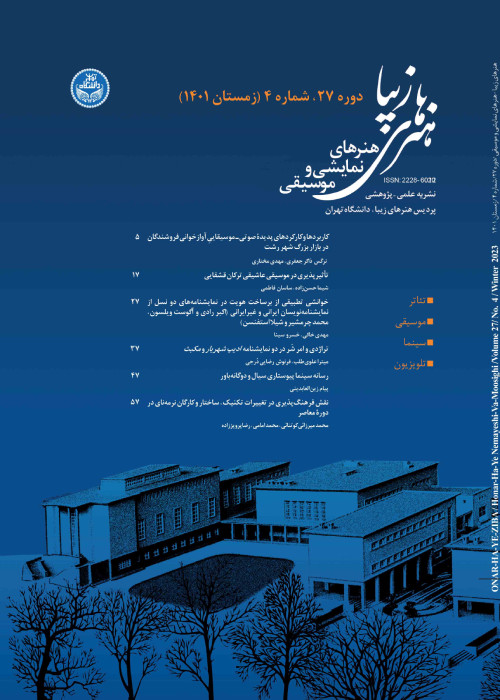Kantian Genius and Beethoven
Author(s):
Abstract:
In the 18th century، the term ‘wit’ was held to be almost equal to the term ‘spirit’، and its notion، being applied both in music and in literature، was one of the most fundamental themes in poetry in the Age of Enlightenment. The meaning of the word changed during the time، however، its importance lasted until the Romantic era. At that period، the term ‘wit’ was defined as ‘intelligence’، and Godsheds used it in his poetry critics as if intelligence، wit، genius and judgment were different aspects of just one notion. Generally the term ‘genius’ demonstrates individual value and dignity. In the Age of Enlightenment، it is this individual dignity which is considered as the only condition for creating an art masterpiece. J. J. Rousseau warns young composers not to go after it. He says that genius is a natural and congenital talent that you will feel it if you have، you will feel it، while you will never understand it if you have not it. Kant deals with ‘genius’ in some paragraphs of his Critique of Judgment- one of the most important and valuable texts on aesthetics and philosophy of arts which is still influential with regard to aesthetical discourses. Kant also starts his work by traditionally paying attention to genius and talent، so that talent is defined as an instinctive gift that arises from the nature of a person، and genius as a force which gives regularity to arts. Kant believes that no knowledge exists as aesthetics except critical aesthetics، and no knowledge exists as knowledge of fine arts except critique of fine arts. He believes that the creation of fine arts is a result of genius. While، unlike Rousseau، Kant never brought up a direct discussion on creation of musical works by genius، the definition he gives for genius in creating all art-works seems to be totally adaptable to musical masterpieces too، signifying that music can be a product of genius as well. In this research we try to demonstrate how Kant’s definition of genius is adaptable to musical works، grounding our discourse on Beethoven and his masterpieces. The main reason for choosing Beethoven is the fact that his music seemingly not only belongs to his own time، but also goes beyond all times and eras. He was the greatest musician of his time and had remarkable impression on his successors. It has always been a matter of discussion، however، whether his creations were due to either much practice or genius. Now through Kant`s definition of genius it can be shown that Beethoven’s works were the results of both his genius and practice. We try to adapt Kant`s definition of genius with Beethoven’s works، and show that the signs of genius in Kant’s terminology are present in them. Moreover، referring to Beethoven pieces، we can show how it is possible to create music by genius in Kantian conception.
Keywords:
Language:
Persian
Published:
Honar-Ha-Ye-Ziba: Honar-Ha-Ye Mosighi Va Namayeshi, Volume:19 Issue: 50, 2014
Pages:
25 to 30
magiran.com/p1319669
دانلود و مطالعه متن این مقاله با یکی از روشهای زیر امکان پذیر است:
اشتراک شخصی
با عضویت و پرداخت آنلاین حق اشتراک یکساله به مبلغ 1,390,000ريال میتوانید 70 عنوان مطلب دانلود کنید!
اشتراک سازمانی
به کتابخانه دانشگاه یا محل کار خود پیشنهاد کنید تا اشتراک سازمانی این پایگاه را برای دسترسی نامحدود همه کاربران به متن مطالب تهیه نمایند!
توجه!
- حق عضویت دریافتی صرف حمایت از نشریات عضو و نگهداری، تکمیل و توسعه مگیران میشود.
- پرداخت حق اشتراک و دانلود مقالات اجازه بازنشر آن در سایر رسانههای چاپی و دیجیتال را به کاربر نمیدهد.
In order to view content subscription is required
Personal subscription
Subscribe magiran.com for 70 € euros via PayPal and download 70 articles during a year.
Organization subscription
Please contact us to subscribe your university or library for unlimited access!


